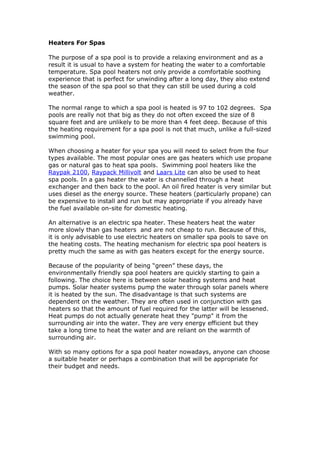
Heaters For Spas
- 1. Heaters For Spas The purpose of a spa pool is to provide a relaxing environment and as a result it is usual to have a system for heating the water to a comfortable temperature. Spa pool heaters not only provide a comfortable soothing experience that is perfect for unwinding after a long day, they also extend the season of the spa pool so that they can still be used during a cold weather. The normal range to which a spa pool is heated is 97 to 102 degrees. Spa pools are really not that big as they do not often exceed the size of 8 square feet and are unlikely to be more than 4 feet deep. Because of this the heating requirement for a spa pool is not that much, unlike a full-sized swimming pool. When choosing a heater for your spa you will need to select from the four types available. The most popular ones are gas heaters which use propane gas or natural gas to heat spa pools. Swimming pool heaters like the Raypak 2100, Raypack Millivolt and Laars Lite can also be used to heat spa pools. In a gas heater the water is channelled through a heat exchanger and then back to the pool. An oil fired heater is very similar but uses diesel as the energy source. These heaters (particularly propane) can be expensive to install and run but may appropriate if you already have the fuel available on-site for domestic heating. An alternative is an electric spa heater. These heaters heat the water more slowly than gas heaters and are not cheap to run. Because of this, it is only advisable to use electric heaters on smaller spa pools to save on the heating costs. The heating mechanism for electric spa pool heaters is pretty much the same as with gas heaters except for the energy source. Because of the popularity of being “green” these days, the environmentally friendly spa pool heaters are quickly starting to gain a following. The choice here is between solar heating systems and heat pumps. Solar heater systems pump the water through solar panels where it is heated by the sun. The disadvantage is that such systems are dependent on the weather. They are often used in conjunction with gas heaters so that the amount of fuel required for the latter will be lessened. Heat pumps do not actually generate heat they "pump" it from the surrounding air into the water. They are very energy efficient but they take a long time to heat the water and are reliant on the warmth of surrounding air. With so many options for a spa pool heater nowadays, anyone can choose a suitable heater or perhaps a combination that will be appropriate for their budget and needs.